|
|
|
Sort Order |
|
|
|
Items / Page
|
|
|
|
|
|
|
| Srl | Item |
| 1 |
ID:
075862
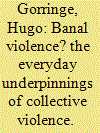

|
|
|
|
|
| Publication |
2006.
|
| Summary/Abstract |
Outbursts of collective violence are often (understandably) met by expressions of outrage or condemnation. 'How is it,' accounts muse, 'that ordinary people can commit such atrocities?' This article argues that an exclusive focus on the violent act can contribute little to our understanding. Instead, it seeks to elucidate the routine processes and actions that serve to render violence acceptable (even banal) as a mode of action. Exclusive identities and a powerful rhetoric of honour, pride, and shame persuade people that violence is either desirable or even necessary in a given context. Following Billig's account of banal nationalism, I argue that grasping these mundane day-to-day processes is essential for an understanding of collective violence. The article draws on research amongst caste-based movements in South India to support this argument.
|
|
|
|
|
|
|
|
|
|
|
|
|
|
|
|
| 2 |
ID:
195089


|
|
|
|
|
| Summary/Abstract |
State and non-state actors often try to provoke moral emotions like guilt and shame to mobilize political change. However, tactics such as `naming and shaming’ are often ineffective, suggesting that policy makers engage in norm violations in ways that minimize moral emotions. We argue that when violating norms, decision makers deal with guilt and shame through coping mechanisms that allow them to pursue policies that contradict their moral standards. We conceptualize guilt and shame as two separate phenomena that provoke distinct reactions. Shame is more likely to provoke immature defenses like denial and distortion, while guilt provokes a more mature and reparative reaction. We provide empirical evidence for this theory by examining two crucial issues on the state of Israel’s political agenda during the first decade of its existence. We analyze political debates over the return of the Palestinian refugees and the reparation agreement between Israel and West Germany, using a series of primary sources from three different political forums.
|
|
|
|
|
|
|
|
|
|
|
|
|
|
|
|
| 3 |
ID:
171304
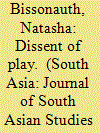

|
|
|
|
|
| Summary/Abstract |
Sa’dia Rehman’s Lotah Stories was an art installation that was exhibited in the bathrooms of Queens Museum of Art in New York during the 2005 Fatal Love show, the first exhibition on South Asian American art in a major venue. Given its unusual placement outside the white cube, one’s encounter with Lotah Stories is jarring. Moreover, Rehman’s crass subject matter incites carnivalesque laughter. This article argues that Rehman’s aesthetics give form to the dissent of play; by situating Rehman within the age of identity art and the emergence of South Asian diasporic art from the 1990s onwards, I maintain that attention to play as a political aesthetic can reshape the way we see difference.
|
|
|
|
|
|
|
|
|
|
|
|
|
|
|
|
| 4 |
ID:
082747
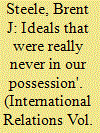

|
|
|
|
|
| Publication |
2008.
|
| Summary/Abstract |
This article addresses how the recent US treatment of suspects detained in its War on Terror relates to the issues of US self-identity and US honor. Both the abuse of these individuals, and the shock which such abuse engenders (when revealed to the US public), are manifested by punishment drives that reinforce a nation's sense of internal honor, which is constructed and connected to a nation's self-identity. While professing commitments to human rights, on the one hand, and interrogation and torture, on the other, are contradictory practices - they are similar in the sense that both are forms of discipline which uphold internally constituted ontological visions of the US Self. Drawing upon a Foucauldian view of ethics, `the relation to oneself', the article avers that precisely because these disciplinary mechanisms are driven by self-identity and protecting the `honor' of the US nation-state, domestic and international actors can use two tactics - `reflexive discourse' and self-interrogative imaging - to stimulate US agents to reform such practices in the future
|
|
|
|
|
|
|
|
|
|
|
|
|
|
|
|
| 5 |
ID:
169283
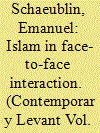

|
|
|
|
|
| Summary/Abstract |
Zakat is the Islamic obligation to give away a share of one’s moveable wealth for the sake of the community—primarily supporting people in need. Based on fieldwork in the Palestinian city of Nablus (2013–2014) where institutional channels for distributing zakat had become blocked due to security crackdowns in 2008, this article analyses direct zakat practices where givers and receivers confront one another in face-to-face interaction. In Nablus, openly displayed material want was assumed to ‘expose’ people living in poor households as well as their relatives and neighbours. Against this background, direct zakat manifested itself as discreet gestures of ‘covering’ need, while people not asking openly for support tended to be praised for their shyness and piety. In direct zakat transfers, people actively cared for how they appeared to one another in social interactions. This ‘ethical work’ of presenting oneself involved reading signs, embodying Muslim virtues and invoking God as the sole source of material provision. Considering the Islamic tradition’s presence within social interactions, this article seeks to understand how Muslim piety exceeds the individual and how the moral responsibility to cover the needs of others is socially distributed.
|
|
|
|
|
|
|
|
|
|
|
|
|
|
|
|
| 6 |
ID:
074176
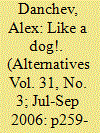

|
|
|
|
|
| Publication |
2006.
|
| Summary/Abstract |
An examination of the disturbing practice of torture and abuse in the "global war on terror," focusing on the methods and motivations of the United States. Proceeding from the imaginary yet all-too-real world of Kafka and the Kafkaesque, it highlights the themes of humiliation and shame in the waging of this war, noting that the damage so caused is reciprocal and indivisible: "Whoever degrades another degrades me."
|
|
|
|
|
|
|
|
|
|
|
|
|
|
|
|
| 7 |
ID:
077445
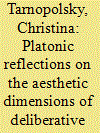

|
|
|
|
|
| Publication |
2007.
|
| Summary/Abstract |
This essay utilizes Plato's insights into the role of shame in dialogical interactions to illuminate the aesthetic dimensions of deliberative democracy. Through a close analysis of the refutation of Polus in Plato's dialogue, the Gorgias, I show how the emotion of shame is central to the unsettling, dynamic, and transformative character of democratic engagement and political judgment identified by recent aesthetic critics of Habermas' model of communicative action and democratic deliberation. Plato's analysis of shame offers a friendly amendment to these aesthetic critiques by showing how the psychological forces at the heart of shame make the outcome of our political engagements with others uncertain and unsettling, even while they make possible the kind of self-reflexivity necessary to foster the deliberative virtue of sincerity or truthfulness
|
|
|
|
|
|
|
|
|
|
|
|
|
|
|
|
| 8 |
ID:
115732
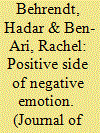

|
|
|
|
|
| Publication |
2012.
|
| Summary/Abstract |
Two studies examined the effects of guilt and shame on coping with situations of interpersonal conflict. The first study used quantitative self-report measures to evaluate the relationship between guilt-proneness and shame-proneness and conflict coping style. The second study content-analyzed participants' narrative reports of interpersonal conflicts to evaluate the distinguishing characteristics of guilt versus shame, and the causal relationship between state guilt and shame and styles of coping with conflict. Findings highlight the characteristics of guilt and shame that may explain their differential influence on coping. Theoretical contributions and applications for conflict resolution and mediation are discussed.
|
|
|
|
|
|
|
|
|
|
|
|
|
|
|
|
| 9 |
ID:
167090
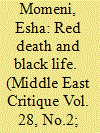

|
|
|
|
|
| Summary/Abstract |
Most of Iran’s urban population experienced the war with Iraq (1980–1988) through the burden of privation and the fear of possible airstrikes. Thus, state-produced media on national television became the main apparatus through which they connected their daily lives to the national conflict. Ravayat-e Fath [The Narrative of Triumph] was one docudrama, comprised of five seasons that the state produced at different intervals between 1984 and 1987. Although Ravayat-e Fath has been presented and received as a journalistic work, it enters the realm of fiction to fulfill its objective: To recruit soldiers. Through a collage of mythical stories, epic narratives, dramatic cinematography, mourning songs accompanied by reports from war fronts, and live interviews with soldiers, the series tells a story of a promised triumph through martyrdom. Through studying Ravayat-e Fath, the most important state-supported television production of the Iran-Iraq war era, this article investigates the ways in which war propaganda in general, and the concept of martyrdom in particular, generated tools like shaming to control the population during and after the war.
|
|
|
|
|
|
|
|
|
|
|
|
|
|
|
|
| 10 |
ID:
161641
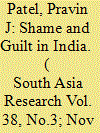

|
|
|
|
|
| Summary/Abstract |
Contemporary Indian society struggles to arrest moral erosion, as traditional social control mechanisms backed by shame have declined. The article argues that unless individual self-control based on a re-configurated morality emphasising shame as well as guilt is sufficiently strengthened, the present negative spiral cannot be reversed. Differences between shame culture and guilt culture are explored to identify how socialisation and education as key mechanisms for transmitting values and morality may be revamped to nurture better consciousness and moral renewal. Educational strategies would need to emphasise duties rather than rights, already reflected in constitutional guidance about Fundamental Duties in the Indian Constitution. Thus, a rational, secular approach that trusts educators to deliver value-based education in India without necessarily strengthening Hindu nationalist tendencies is suggested as a viable way forward.
|
|
|
|
|
|
|
|
|
|
|
|
|
|
|
|
| 11 |
ID:
174599
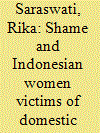

|
|
|
|
|
| Summary/Abstract |
Studies on divorce and shame in Indonesia have found that shame has been used by the Indonesian government to restrict divorce; however, this built on existing negative cultural constructions of the female divorcee. Although being a widow is also stigmatised by the public, this is to a lesser extent than for a divorced woman. Research has shown that the concept of shame has been one of the barriers that women face when considering disclosing their marital problems, in this instance domestic violence. In general, this concept continues to exert influence on and within Indonesian women as it has been culturally and legally embedded in Indonesian society. Regardless of their identities, all respondents felt shame when they experienced domestic violence. The experiences of Indonesian women in responding to and making decisions dealing with domestic violence differ because their response depends on their needs and interests.
|
|
|
|
|
|
|
|
|
|
|
|
|
|
|
|
| 12 |
ID:
128877
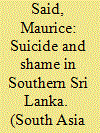

|
|
|
|
|
| Publication |
2014.
|
| Summary/Abstract |
This article shows how successful youth suicides and attempted suicides in the south of Sri Lanka are utilised as tools against an oppressive and limiting kinship structure. The majority of youth suicides in southern Sri Lanka appear to be aimed at disempowering close kin and publicly challenge the moral authority of the kin network, resulting in cleavages in the local distribution of power and status. The forms of suicide imbue the victim's family with shame, thus questioning and challenging the 'boundedness' of the family unit. Using three contrasting case studies involving a domestic argument between a young man and his spouse, a young couple from rival families, and a young woman in a post-tsunami camp, this fieldwork-based research illustrates how youth suicides bring to the fore internal tensions in the family.
|
|
|
|
|
|
|
|
|
|
|
|
|
|
|
|
| 13 |
ID:
104093
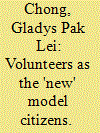

|
|
|
|
|
| Publication |
2011.
|
| Summary/Abstract |
Voluntary services and the word 'volunteer' have been discursively highlighted as something 'new' in China in the last few years. The large number of volunteers involved in relief work following the 5/12 Sichuan earthquakes, in the Beijing Olympics in 2008, and in the 2010 Shanghai Expo are examples of this yet understudied phenomenon. This article aims to examine volunteerism and its close relationship with the production of model citizens. It attempts to shed light on how China uses soft power - through appeal and attraction - in its governing strategies. Informed by Foucault's work on governmentality, this article aims to show how promotional strategies and training materials pertaining to volunteering programmes acted as governing strategies that invoked and produced specific power relationships through which the state governed its citizens. Taking the Beijing Olympic volunteer programme as a case to examine how a new model citizenry is produced, I trace three discourses: dream and glory, hosting a great Olympics, and not to 'lose face'. These discourses shape citizens' everyday lives; they help volunteers internalize and embody the ideal of a model citizen, and as such they are part of the organized practices through which subjects are governed in China.
|
|
|
|
|
|
|
|
|
|
|
|
|
|
|
|
|
|
|
|
|